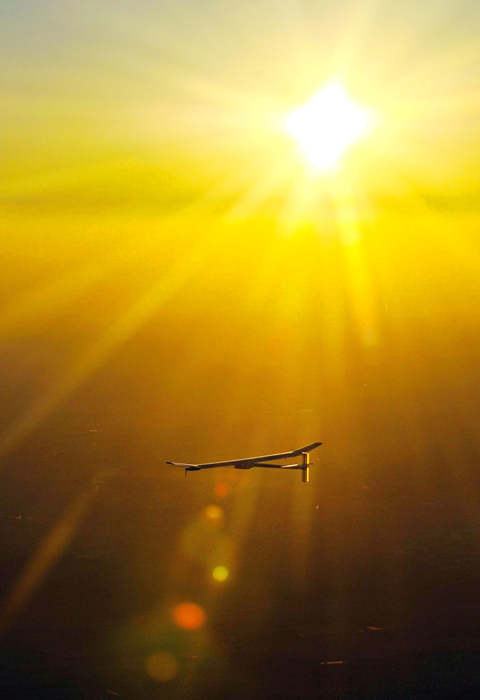An experimental solar-powered plane landed safely yesterday after completing its first 24-hour test flight, proving that the aircraft can collect enough energy from the sun during the day to stay aloft all night.
Pilot Andre Borschberg eased the Solar Impulse aircraft onto the runway at Payerne airfield about 50km southwest of the Swiss capital Bern at exactly 9am yesterday.
Helpers rushed to stabilize the pioneering plane as it touched down, ensuring that its massive 63m wingspan didn’t touch the ground and topple the craft.

PHOTO: EPA
The record feat completes seven years of planning and brings the Swiss-led project one step closer to its ultimate aim of circling the globe using only energy from the sun.
The team says it has now shown the single-seat plane can theoretically stay in the air indefinitely, recharging its depleted batteries using 12,000 solar cells and nothing but the rays of the sun during the day.
Borschberg took off from Payerne airfield into the clear blue sky shortly before 7am on Wednesday, allowing the plane to soak up plenty of sunshine and fly in gentle loops over the Jura mountains west of the Swiss Alps.
The 57-year-old former Swiss fighter dodged low-level turbulence and thermal winds, endured freezing conditions during the night and ended the test flight with a picture-perfect landing to cheers and whoops from hundreds of supports on the ground.
After completing final tests on the plane, he embraced the project’s co-founder, Bertrand Piccard, before gingerly unstrapping himself from the bathtub size cockpit he had spent more than 26 hours sitting in.
“When you took off it was another era,” said Piccard, a record-breaking balloonist. “You land in a new era where people understand that with renewable energy you can do impossible things.”
Although the goal is to show that emissions-free air travel is possible, the team said it didn’t see solar technology replacing conventional jet propulsion any time soon. Instead, the project is designed to test and promote new energy-efficient technologies.

MORE VISITORS: The Tourism Administration said that it is seeing positive prospects in its efforts to expand the tourism market in North America and Europe Taiwan has been ranked as the cheapest place in the world to travel to this year, based on a list recommended by NerdWallet. The San Francisco-based personal finance company said that Taiwan topped the list of 16 nations it chose for budget travelers because US tourists do not need visas and travelers can easily have a good meal for less than US$10. A bus ride in Taipei costs just under US$0.50, while subway rides start at US$0.60, the firm said, adding that public transportation in Taiwan is easy to navigate. The firm also called Taiwan a “food lover’s paradise,” citing inexpensive breakfast stalls

TRADE: A mandatory declaration of origin for manufactured goods bound for the US is to take effect on May 7 to block China from exploiting Taiwan’s trade channels All products manufactured in Taiwan and exported to the US must include a signed declaration of origin starting on May 7, the Bureau of Foreign Trade announced yesterday. US President Donald Trump on April 2 imposed a 32 percent tariff on imports from Taiwan, but one week later announced a 90-day pause on its implementation. However, a universal 10 percent tariff was immediately applied to most imports from around the world. On April 12, the Trump administration further exempted computers, smartphones and semiconductors from the new tariffs. In response, President William Lai’s (賴清德) administration has introduced a series of countermeasures to support affected

CROSS-STRAIT: The vast majority of Taiwanese support maintaining the ‘status quo,’ while concern is rising about Beijing’s influence operations More than eight out of 10 Taiwanese reject Beijing’s “one country, two systems” framework for cross-strait relations, according to a survey released by the Mainland Affairs Council (MAC) on Thursday. The MAC’s latest quarterly survey found that 84.4 percent of respondents opposed Beijing’s “one country, two systems” formula for handling cross-strait relations — a figure consistent with past polling. Over the past three years, opposition to the framework has remained high, ranging from a low of 83.6 percent in April 2023 to a peak of 89.6 percent in April last year. In the most recent poll, 82.5 percent also rejected China’s

PLUGGING HOLES: The amendments would bring the legislation in line with systems found in other countries such as Japan and the US, Legislator Chen Kuan-ting said Democratic Progressive Party (DPP) Legislator Chen Kuan-ting (陳冠廷) has proposed amending national security legislation amid a spate of espionage cases. Potential gaps in security vetting procedures for personnel with access to sensitive information prompted him to propose the amendments, which would introduce changes to Article 14 of the Classified National Security Information Protection Act (國家機密保護法), Chen said yesterday. The proposal, which aims to enhance interagency vetting procedures and reduce the risk of classified information leaks, would establish a comprehensive security clearance system in Taiwan, he said. The amendment would require character and loyalty checks for civil servants and intelligence personnel prior to